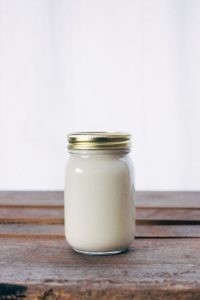 It’s not often that mainstream medical news outlets report positively on nutritional interventions, but we have an impressively enthusiastic article recently coming from Medscape of all places (a medical information website owned by WebMD) on the subject of irritable bowel syndrome (IBS).
It’s not often that mainstream medical news outlets report positively on nutritional interventions, but we have an impressively enthusiastic article recently coming from Medscape of all places (a medical information website owned by WebMD) on the subject of irritable bowel syndrome (IBS).
The article reports the research of Dr. Manju Girish Chandran and colleagues. They enrolled 189 patients with IBS and attempted to test the effects of microbiome modulation with homemade yogurt. Using a cup of Dannon yogurt as a starter, the study subjects made their own yogurt and consumed an average of 2 cups per day. The results? Incredibly, within 6 months, 169 (89%) of the study participants achieved complete remission.
IBS is incredibly common, and it’s now known that the majority of cases of IBS are actually due to small intestine bacterial overgrowth (SIBO). Because of the overgrowth aspect, using probiotics in those with IBS/SIBO has been controversial among SIBO experts and practitioners due to concerns about adding to the already overabundant bacterial counts in the small intestine. This concern appears to be rational and is also consistent with a good amount of clinical experience. I have personally observed many cases in which those with SIBO reacted poorly to typical lactobacillus-type probiotics. However, the truth is that the vast majority of the published medical literature actually supports a beneficial role for probiotics in those with SIBO. In fact, you will be hard-pressed to find any study showing detrimental effects from probiotics in those with SIBO. I don’t think this negates these other clinical observations, but it probably does mean that the concerns about probiotics in SIBO are a little bit overblown, and these intolerance cases probably represent a small minority. This concern should be evaluated and addressed on a case-by-case basis.
Using homemade yogurt in this new IBS study was a great idea. Making yogurt is relatively easy and much more inexpensive than buying preprepared commercial yogurt. Fermented foods are loaded with bacteria/probiotics, and can contain up to 1 billion CFUs/gram and possibly more. While the number of bacteria in the yogurt was not analyzed in this study, if the potency of bacteria was as high as 1 billion CFUs per gram, this would mean that the study participants were “supplementing” with almost 500 billion CFUs of yogurt-based probiotics per day (there are 245 grams in one cup of yogurt, and they consumed 2 cups per day). Not all yogurts are this high in bacterial CFUs (e.g. this study used a commercial yogurt containing about 112 billion CFUs per cup), but they are usually still pretty potent — more potent than most probiotic supplements. Consumer Reports tested yogurt a few years back and found that it typically contained between 90 billion and 500 billion CFUs per serving. This is pretty impressive. Not that high doses are always necessary. They aren’t. But in some cases it’s a good thing, and it shows that one can certainly use fermented foods to supplement large amounts of probiotics if desired.
Will this change how I approach SIBO? Probably in some cases. Antimicrobial therapy has a proven track record and will continue to be useful, especially in severe cases. I would also be cautious using dairy indiscriminately since so many of my clients often have dairy sensitivities. While IBS symptoms might improve, I would want to make sure other types of delayed hypersensitivity reactions weren’t occurring due to IgG reactions. Studies like this don’t account for nuanced individual differences.
It is likely that other non-dairy fermented foods would work similarly. A study was conducted last year (but not published yet) evaluating the effect of sauerkraut on IBS. Fermented vegetables, like yogurt, are probiotic powerhouses. Dr. Joseph Mercola claims to have sent his sauerkraut off to a lab for analysis with the results showing a whopping 10 trillion bacteria in a mere 4-6 ounce serving. I have yet to see the analysis so I don’t know how true that is. However, official reports typically list the bacterial count within fermented food products to be somewhere between one million to one billion CFUs per gram:
Nonetheless, some of the most familiar fermented foods, including sauerkraut, kimchi, kefir, dry fermented sausage, yogurt, cheese, kombucha, and miso ordinarily contain viable cells in notable quantities ranging between 10^6 and 10^9 cells/g or cells/ml. A relatively large fraction of those microbes survives passage through the human digestive tract. The ingestion of fermented foods potentially increases the numbers of microbes in the diet by up to 10,000-fold. (Health benefits of fermented foods: microbiota and beyond)
There is still a place for probiotic supplements when you need a strain-specific application (and I especially think there is a genuine benefit in using supplemental soil-based or spore forms of bacterial therapy), but for those who prefer a food-based approach or for those who have been refractory to other treatments, homemade yogurt could be a reasonable therapy to try!
Here is a link to a PDF I made of the Medscape article for those who don’t have a Medscape account: Homemade Yogurt Resolves Irritable Bowel Symptoms

Recent Comments